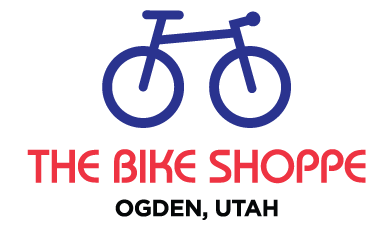
Trek Hardtail MTB Buyer's Guide
Trek hardtail mountain bikes boast off-road performance without the extra weight and cost of a full-suspension setup. With so many models available, we’ve put together this helpful guide that walks you through Trek models designed for XC, bikepacking, trail, and eMTB riding.
What are Trek Hardtail Mountain Bikes?
Hardtails are mountain bikes that feature a rigid rear end— hence “hard tail”— and a front suspension fork. The lack of a rear shock means hardtails are lighter, less expensive, and more efficient since there’s no rear suspension that soaks up your pedal-power.
Hardtail MTBs are the bike of choice for cross-country racers who prioritize speed as well as riders who tackle lighter singletrack where a full-suspension setup isn’t necessary. As one of the biggest names in the game, Trek offers a wide variety of hardtail mountain bikes so any rider, no matter their riding style, can find their perfect match.
Still deciding between hardtail and full-sus? Check out Trek’s entire range of hardtail and full-suspension models.
Which Trek Mountain Bikes are Hardtails?
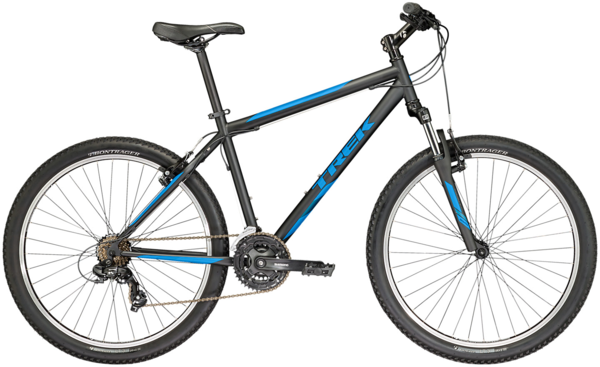
Trek 820
Highlights:
Style: Entry-level
Fork travel: 75mm
Wheels: 26”
Brakes: Rim
Frame: Steel
Drivetrain: 3x7
The 820 is Trek’s most affordable mountain bike and is a great option for riders looking to start exploring off-road trails. This entry-level MTB is appropriate for light terrain and urban environments filled with curbs and potholes.
The 820 has been a go-to, multipurpose bike for budget-conscious riders for decades and continues to impress on light singletrack, gravel paths, and city streets.
Top Specs
Durable steel frame
The 820 is built around a rugged steel frame with classic MTB geometry for a smooth ride and long-lasting performance.
Useful rack mounts
There are integrated bolts so you can easily install a rear rack. Secure accessories or panniers to the bike to make commuting a breeze.
Great-value Shimano drivetrain
Shimano Tourney 3x7-speed groupset proves a wide range of gears so you can pedal comfortably no matter the gradient. Climb hills with ease and show your inner speed demon on the flats.
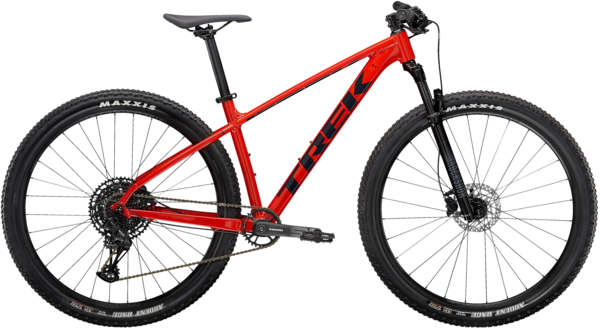
Trek Marlin
Highlights:
Style: Entry-level/XC
Fork travel: 100mm (80mm on XS frame)
Wheels: 27.5” (XS/S) 29” (M-XXL)
Brakes: Mechanical disc
Frame: Aluminum
Drivetrain: 1x12
The versatile, trail-ready Trek Marlin is one of the most popular MTBs on the market— and for good reason.
There are several spec versions available so you can customize this bike to your needs and budget, whether its fast singletrack or daily commuting.
The race-inspired frame feels at home in the forest as well as weaving through traffic— the ultra-capable Marlin is what you make it.
Top Specs
Feature-laden aluminum frame
Trek’s Alpha Silver Aluminum frame is lightweight and comes with integrated rack and kickstand mounts to easily add accessories. Brake and shift cables are neatly routed inside the frame.
Mechanical disc brakes
Upgrade from rim brakes with these dependable Tektro mechanical disc brakes with 160mm rotors that provide plenty of stopping power, even in wet conditions.
Seven frame sizes for the perfect fit
Frame sizes range from XS to XXL so every rider, regardless of height, can pedal comfortably and efficiently. Runs as a Trek hardtail 27.5 on XS and S frames to preserve a balanced geometry.

Trek Roscoe
Highlights:
Style: Trail
Fork travel: 120-140mm
Wheels: 27.5” (XS/S) 29” (M-XXL)
Brakes: Mechanical disc
Frame: Aluminum
Drivetrain: 1x12
For hardtail riders with a soft spot for rowdy terrain, the Trek Roscoe comes equipped with a longer-travel fork and dropper post.
It has a snappier ride feel than a full-suspension set up, but still dominates tough terrain thanks to hydraulic disc brakes and a grippy wheelset.
This Trek hardtail trail bike is available in a few versions and it’s clear that the Roscoe is designed for fun thrills out there on harder-hitting routes.
Top Specs
Progressive geometry
The Aluminum Alpha Gold frame features a long reach, slack 65° head tube, and steep 73° seat tube for better mountain maneuverability. There are compact 430mm chainstays and wide 780mm handlebars for increased control.
Trail-munching rims and rubber
Depending on the model, there are fast-rolling 27.5”+ or 29” wheels matched with knobby tires. The 27.5”+ rims run wide 2.8” tires so the effective diameter is close to a true 29er.
Dropper post for more control
The only Trek hardtail with dropper post, there’s a remote lever to move the saddle out of the way on technical descents and quick corners.
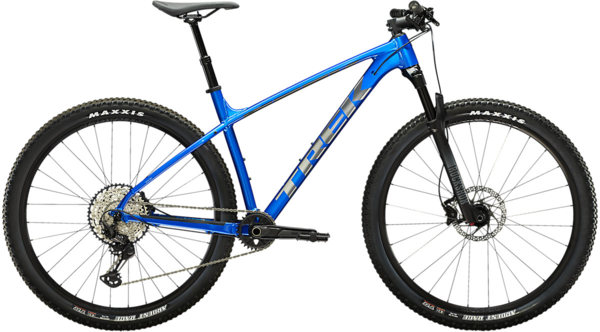
Trek X-Caliber
Highlights:
Style: XC
Fork travel: 100mm
Wheels: 27.5” (S) 29” (M-XXL)
Brakes: Hydraulic disc
Frame: Aluminum
Drivetrain: 1x12
The X-Caliber is a purebred XC bike that punches far above its weight class.
This 100mm travel model is a great value for cross-country racers who like to spice up the route with some additional singletrack or city streets.
The durable aluminum construction and 1x drivetrain are long-lasting features that’ll stand up to daily use and extended XC rides.
The X-Caliber looks like a million bucks on the trail while still being wallet-friendly.
Top Specs
1x drivetrain
Each X-Caliber features a simple 1x drivetrain with a wide range cassette for straightforward shifting no matter the gradient. Pedal efficiently up the climbs and get ready to smash the flats.
Plenty of accessories if you want them
There are integrated rack and kickstand mounting points on the frame so you can easy install extra bits and transform the bike into a daily commuter. The frame can fit an internally-routed dropper post, too.
XC-specs at a great price
Fast-rolling 29” hoops, 100mm of front suspension, and grippy tires give this XC model race-winning potential— and the competitive price is worth celebrating, too.
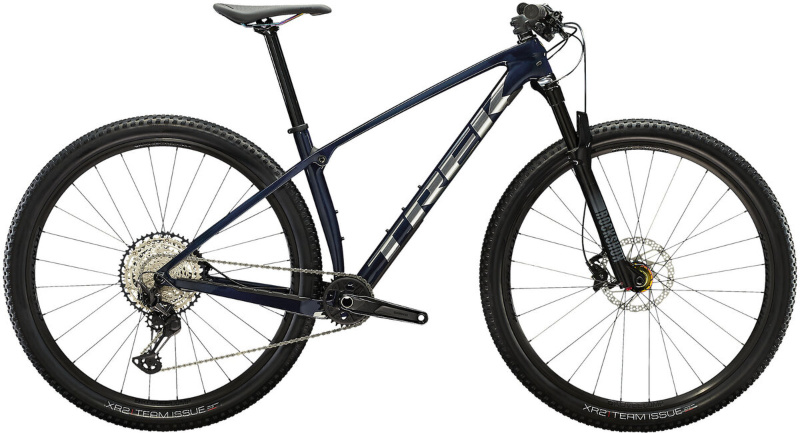
Trek Procaliber
Highlights:
Style: XC race
Fork travel: 100mm
Wheels: 29”
Brakes: Hydraulic disc
Frame: Carbon
Drivetrain: 1x12
The fastest XC model of the bunch, the Procaliber is a carbon hardtail that has racing in its DNA.
Trek’s innovative IsoSpeed decoupler located at the seat tube junction provides extra frame compliance compared to the X-Caliber and takes the sting out of extended XC sessions.
There’s a ton more tech packed into the lightweight setup to assist you in claiming your rightful spot atop the podium.
Top Specs
Trek hardtail 29” tubeless out of the box
All frame sizes run XC-specific 29” rims that are already setup tubeless in order to save precious grams, get better traction, and avoid pesky punctures.
IsoSpeed decoupler
This low-profile piece of tech increases vertical compliance and smoothes out terrain while preserving the hardtail efficiency XC racers know and love.
OCLV Mountain Carbon
All Procaliber models are constructed from OCLV Mountain Carbon to keep the weight to a minimum. The Straight Shot downtube injects stiffness while Knock Block technology prevents frame damage in the case of a tumble.
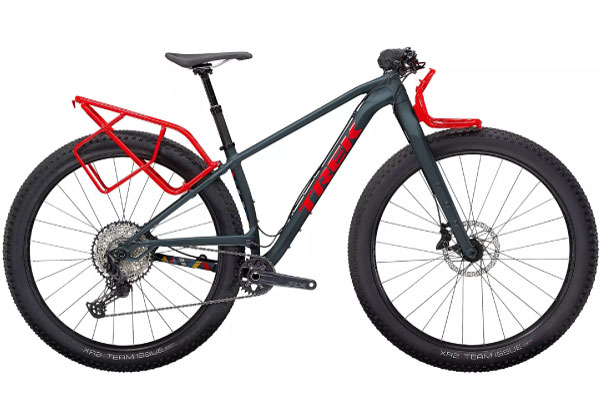
Trek 1120
Highlights:
Style: Adventure
Fork: Rigid
Wheels: 29”
Brakes: Hydraulic disc
Frame: Aluminum
Drivetrain: 1x12
The 1120 stands out as a dedicated bikepacking model with plenty of frame mounts and mountain-ready specs.
This isn’t the traditional touring setup— Trek has gathered up all the latest tech and design ideas to bake in unlimited off-road capability, including the 1x drivetrain and 29”+ tires.
The rigid frame easily carries all your adventure gear so you can reach even the most remote destinations in the backcountry.
Top Specs
Built for bikepacking
Take all the gear you need thanks to the integrated front and rear rack mounts as well as spots for extra water bottles or packs on the fork.
Go big with Trek hardtail 29”+ tires
29+ wheels can fit oversized tires up to 3.0” with tons of air volume that grips the ground and provides much needed cushion on long expeditions.
Customized rear triangle
Special attention to the back end of the frame introduces horizontal sliding dropouts to accommodate single speed setups and the elevated chainstay fits a 29” rim without elongating the wheelbase.
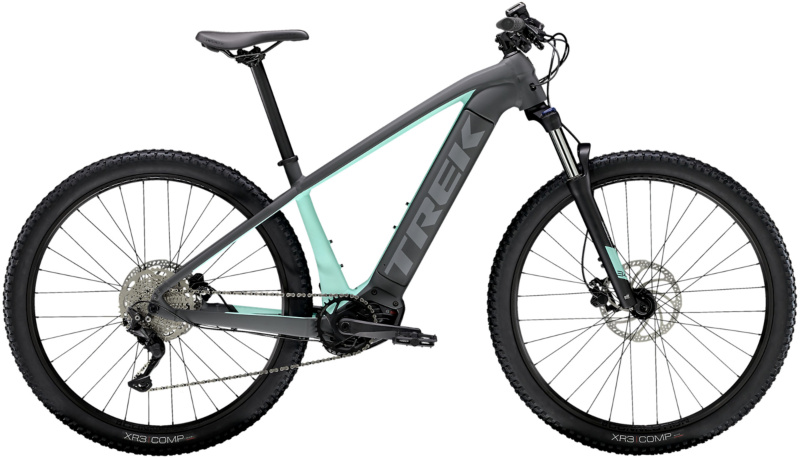
Trek Powerfly
Highlights:
Style: XC eMTB
Fork travel: 120mm (80mm on XS frame)
Wheels: 27.5” (XS/S) 29” (M-XXL)
Brakes: Hydraulic disc
Frame: Aluminum
Drivetrain: 1x12
The Powerfly is Trek’s most affordable electric mountain bike, available in hardtail or full-suspension versions.
The Trek hardtail ebike features a stiffer frame made of Trek’s Alpha Platinum Aluminum and 120mm of front travel to tackle light terrain or float over city potholes.
There’s a powerful Bosch motor that flattens out hills so you can enjoy the journey more than ever.
Top Specs
Bosch Performance Line CX motor
At the heart of this ebike lies a 250W motor with 85 Nm of torque, pedal-assist up to 20 mph, and intelligent eMTB mode that adapts to the terrain.
Shimano Deore drivetrain
Trek hardtail electric mountain bike runs the trail-ready Shimano groupset with a long cage derailleur and 11-46 10-speed cassette.
User-friendly removable battery
Trek’s Removable Integrated Battery (RIB) system tucks the high-capacity battery into the downtube and can be quickly removed— no tools required— for easy transport or charging.
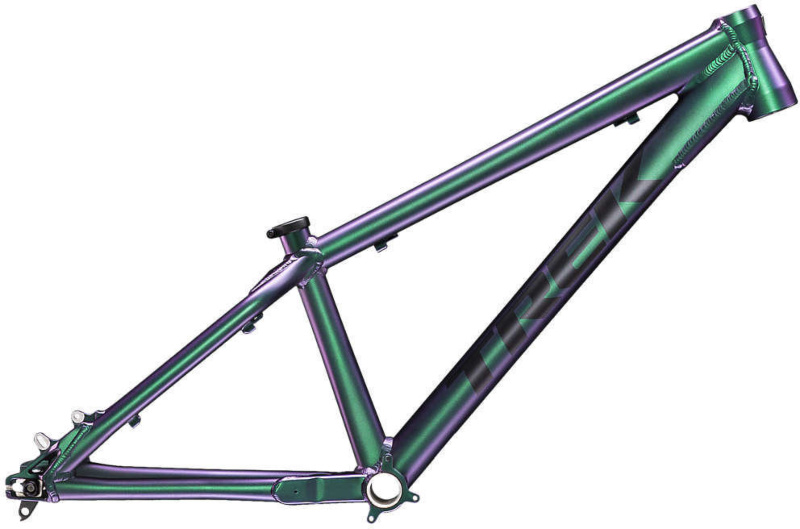
Trek Ticket DJ Frameset
Highlights:
Frameset only
Style: Dirt Jump
Material: Aluminum
Horizontal sliding dropouts
Threaded BSA BB
The Trek Ticket is available as a lightweight dirt jump frame that riders can build up to their own specifications.
The Ticket S features a rear shock to handle the big jumps of slopestyle whereas the Ticket DJ is a fully rigid aluminum frame.
If dirt jumps, skate parks, or pump tracks are your thing, the DJ is the perfect skeleton for your customized bike.
Top Specs
Versatile, trick-ready geometry
DJ frame has a compact rear triangle and spacious top tube area so you can pull off serious tricks and whip this bike around.
Completely customizable
142x12mm horizontal sliding dropouts accommodate single speed or geared builds so you can personalize the frame according to your riding style.
High-quality aluminum frame
Trek’s Alpha Platinum Aluminum material is lightweight and super-durable to stand up to daily use and being thrown around at the skatepark.
Trek Hardtail Mountain Bike Size Chart | |||||
| XS | S | M | M/L | L | XL |
| 4'5"-5'1" | 5'-5'5" | 5'3"-5'9" | 5'5"-5'10" | 5'10"-6'2" | 6'2"+ |
Hardtail vs Full-Suspension
What a dilemma! You're a beginner and you've just started shopping for a new mountain bike. You're starting realizing there are about a bazillion options out there. Where do you start? First, ask yourself some questions:
- How much do I want to spend?
- Where do I want to ride?
- What types of trails will I ride on?
- Will I ride with anyone? What do they ride?
- What are my goals?
You can easily break down mountain bikes into two main categories: hardtail and full-suspension. Depending on how you answer these questions, you may find yourself leaning more toward one way vs another. There's definitely more to consider when looking to drop a lot of coin on a new sweet ride, but hopefully this helps you get started:
Hardtail | Full-Suspension |
| Less expensive ($700+) Best suited for:
Power-efficient Snappy acceleration More skill to master off-road | More expensive ($2500+) Best suited for:
Pedal efficiency more dependent on design and amount of travel Less skill to master off-road |
Hardtail vs Full-Suspension Mountain Bike FAQs
Are hardtail bikes good for mountain biking?
Yes! Hardtails are super fun to ride. The Trek Marlin, X-Caliber, and Procaliber models are best suited for singletrack XC riding. Trek Roscoe is beefier, longer, and slacker making it uber capable on rough, techy trails. Hardtails tend to be lighter, snappier, and more affordable than full-suspension bikes, but you'll definitely start feeling the abuse on your body after a long decent.
Are hardtail mountain bikes better?
It really depends on the type of trail you’re riding. Hardtails can perform better than full-suspension bikes on smoother terrain where speed and agility is more important than suspension. Hardtails are definitely more affordable, and you'll get a better component group at any given price point. But when it comes to versatility, full-suspension rules the day.
Are hardtail mountain bikes good for road use?
You bet. It can't keep up with or replace a road bike, but hardtails make for excellent commuter and fitness bikes that allow for more terrain versatility than a road or hybrid bike might.
What is a hardtail best for?
Most hardtail mountain bikes are best suited for smoother cross-country terrain and fast-paced singletrack. Hardtails are also very popular with commuters due to their comfort and versatility improvements over fitness and commuter bikes. But that's not all! Many manufacturers are jumping on board a new trend of truly trail-worthy and almost enduro-capable hardtails that are designed to rip! Trek's Roscoe or Yeti's ARC are two such beasts.
Can you ride black diamond downhill on a hardtail?
Not a good idea. Keep it smoother. It’s a better idea to descend downhill routes on a full-suspension setup that can handle large obstacles and provide traction in the steepest sections. Newer trail-focused hardtails like the Roscoe are super tough bikes, but even a skilled rider would have a rough time ripping down an enduro course without any reservations.
Can you jump hardtail mountain bikes?
Absolutely! Some of the best dirt jumpers are hardtails. Just make sure your bike is designed for dirt jumps. DO NOT jump a Marlin, X-Caliber, or Procaliber! Instead, take a look at the Trek Ticket or Pivot Point. These models are beefed up to handle the stress of big air. They offer longer top tubes and compact rear ends for improved handling and major style.
What is the best hardtail mountain bike brand?
Trek is definitely at the top of the list. Trek make great bikes for every rider at nearly every reasonable price point from $600 to over $10,000. Plus, they're great people to work with. Their warranty is excellent, and they stand behind their products. After more than 40 years working with them, we feel confident putting their bikes up against anything else out there.
Are hardtails better for climbing?
Hardtails are extremely efficient at converting pedal power into forward motion. However, as the technical difficulty of the trail increases, full-suspension bikes can offer improved traction as the rear wheel can move with the terrain.
What should I look for when buying a hardtail?
Try to find the best value for your money. Look at the entire bike. Sometimes manufacturers get sneaky and put better components where they'll be most visible (like the rear derailleur) then seriously cut quality in less-known areas. Look at the complete drivetrain to see if they maintain the level of quality across the entire group paying close attention to the crank, chain, and cassette. Shocks matter, so if you can afford it, try to get a suspension fork branded Rock Shox or Fox. There are certainly more good brands out there, but those two are really common. Wheels are also super important because they take such a beating. Double-wall rims are a must, and a higher spoke count (32) would be a good idea. Good luck bike hunting!
Do you really need a full-suspension mountain bike?
Needs are tricky. No, you don't really need a full-suspension bike, but they are SOOOO nice! The more time you hope to spend off-road and the more techy the trails, the more appealing a full-suspension bike becomes. Consider who you'll be riding with. What types of bikes are they riding? Think bout where you want to ride. How difficult are the trails? Analyze your goals, and get the bike that fits best.
Is a hardtail mountain bike good for beginners?
Yes, hardtail mountain bikes are a great place to start as riders develop their skills. They're durable, affordable, and simple to maintain. However, full-suspension bikes tend to be easier to ride off-road because the suspension compensates where skills may be lacking.
